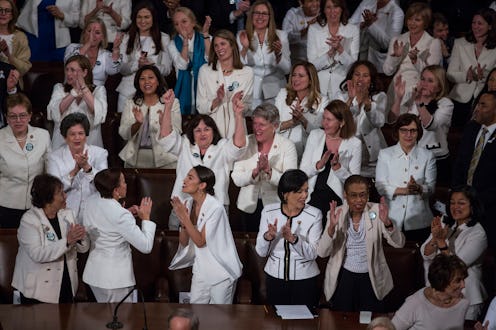News
Where Congress Ranks Among The Rest Of The World For Gender Equality Is Not Great

A recent study from the Inter-Parliamentary Union on gender equality had some pretty bad news about the United States. According to the exhaustive research, based on information from January of this year, the U.S. ranked 78 among 193 countries when it comes to gender equality in Congress. The placement brings the United States neck and neck with Montenegro.
The study was focused on the percentage of women in parliamentary bodies across the world. And it involves a little bit of math. Women in the United States House and Montenegro's single-body legislature (also known as a unicameral system) comprise only 23.5 percent of the entire body.
The world average of percentage of women that make up such a legislature is 24.3 percent, according to the Inter-Parliamentary Union. The situation with gender equality is only little better in the Senate. According to the study, 25 percent of the U.S. Senate is made up of women.
The Inter-Parliamentary Union classified Rwanda as the country with the highest percentage of women in its parliament. In February, the World Economic Forum suggested that this kind of female representation in a country's legislature can have a tremendous impact on public health, infant and maternal mortality, and bridging gender gaps in different professional sectors.
The study was published shortly before International Women's Day, which is on Friday, and comes with an additional write-up urging parliamentary bodies around the world to amplify the voices of women politicians.
In a press statement, the Inter-Parliamentary Union's president and Mexican parliamentarian, Gabriela Cuevas Barron, said, "More women in parliament mean better, stronger and more representative democracies that work for all the people."
"The one percent increase we saw in 2018 represents a small improvement on women's parliamentary representation," she added. "This means we are still a long way to achieving global gender parity."
In order to reach gender equality on a broader global level, Cuevas Barron added, "We urge for greater political will in adopting well-designed quotas and electoral systems that eliminate any legal barrier that might be hindering the opportunities for women to enter parliament."
The organization's secretary general, Martin Chungong, also echoed Cuevas Barron's suggestions and said that "well-designed and well-implemented gender quotes" are showing their impact in different parliaments.
The organization did note, however, that a country simply claiming to have a gender quota in its parliament or congressional body is not enough. For female representation to bear any impact on policies at a domestic level in a country, the Inter-Parliamentary Union urges lawmakers to have actual mechanisms and policies in place for tangible results.
Even with America standing at the 78th position in the study's list, things are seemingly looking up. According to the organization, the new crop of politicians entering the House and the Senate was remarkable. "The elections in the United States were historic in terms of the inclusion of new groups of legislators," the Inter-Parliamentary Union stated. "Both the lower (23.5 percent) and upper houses (25 percent) included more women than ever before."